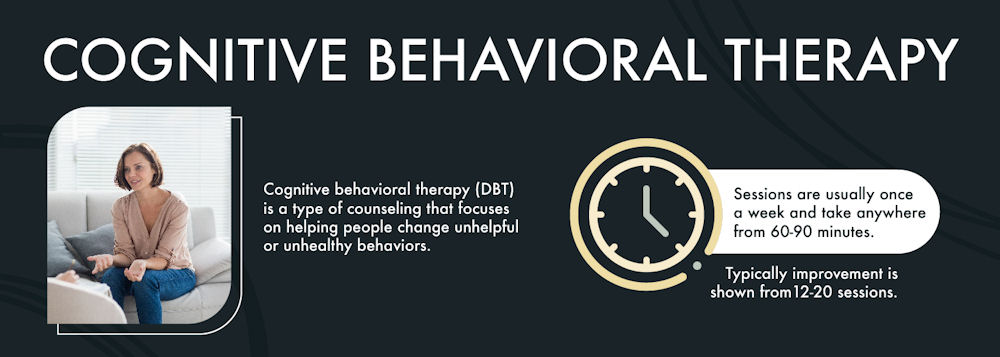CBT for Substance Abuse in Houston, Texas
There are certain forms of treatment that work better for certain individuals than others. This is because everybody has their own experiences and needs. For most, traditional treatment options are the best approach; for others, more holistic methods may be necessary. Regardless of what the case may be, substance abuse programs are imperative to recovery and stability.
What Is Cognitive-Behavioral Therapy?
Cognitive-behavioral therapy (CBT) is a type of psychotherapy that helps people change their thoughts and behaviors to improve their lives. CBT can be used to treat a wide variety of mental health conditions, including depression, anxiety, eating disorders, and substance abuse.
The goal of CBT for substance abuse is to help people learn how to better cope with the challenges of life by changing the way they think and behave. CBT is a short-term treatment that typically lasts for 12 weeks or less. During CBT, patients work with a therapist to identify and change negative thought patterns and unhealthy behaviors.
CBT is an effective treatment for many mental health conditions. In general, This type of therapy is most effective when it is used to treat conditions that are primarily driven by negative thoughts and behaviors, such as anxiety and depression. CBT for substance abuse may also help treat more complex conditions such as eating disorders.
What is the Cognitive Triangle?
The cognitive triangle is a model of human cognition proposed by George Miller in his 1956 paper “The Magical Number Seven, Plus or Minus Two: Some Limits on Our Capacity for Processing Information”. The triangle consists of three vertices:
- Information processing
- Memory
- Perception
Information processing refers to how we take in, encode, store, and retrieve information. Memory refers to how we store information over time so that we can access it later. Perception refers to how we interpret the information that we take in.
The cognitive triangle provides a framework for understanding how our cognition works. It helps us to understand the limitations of our cognition, and how we can make use of our cognitive abilities to improve our lives.
One limitation of our cognition is that we can only process a certain amount of information at any given time. This is known as our cognitive load. Our cognitive load can be limited by our working memory, which is the amount of information that we can keep in our minds at any given time.
How Do I Increase My Cognitive Load?
We can increase our cognitive load by using strategies such as chunking, which is the process of breaking down information into smaller pieces that are easier to remember. We can also use mnemonic devices, which are memory aids that help us to remember information more easily.
Another limitation of our cognition is that we are subject to biases, which are judgments that we make about people or situations that are not based on facts. By using critical thinking skills, such as identifying our own biases and considering other points of view, we can reduce our biases.
Cognition is also affected by emotions, which can influence the way we process information. For example, if we are feeling anxious, we may pay more attention to negative information and less to positive information.
We can improve our cognition by using strategies to reduce the impact of emotions, such as mindfulness or relaxation techniques. We can also improve our cognitive skills through practice and training.
What is Cognitive Behavioral Therapy (DBT)?

Cognitive behavioral therapy (DBT) is a type of counseling that focuses on helping people change unhelpful or unhealthy behaviors. It was originally developed to treat borderline personality disorder, but it has since been shown to be effective in treating several other mental health disorders as well.
CBT for substance abuse combines techniques from both cognitive-behavioral therapy and Zen meditation. The goal of CBT is to help people learn to accept themselves, even with their imperfections. It also teaches people how to better cope with stress and difficult emotions.
This type of therapy typically consists of weekly individual sessions and group skills training sessions. In the individual sessions, you will work with your therapist to identify and change any thoughts or behaviors that are contributing to your distress. In the group sessions, you will learn and practice skills such as mindfulness, emotion regulation, and interpersonal effectiveness.
What Are the Benefits of CBT for Substance Abuse?
Cognitive-behavioral therapy (CBT) is an effective treatment for a variety of mental health conditions, including anxiety disorders, depression, and substance abuse. CBT is a short-term, goal-oriented therapy that helps people learn to identify and change negative thinking patterns and behaviors that contribute to their distress.
CBT for substance abuse is an effective treatment for anxiety disorders, depression, and substance abuse. CBT is often considered the gold standard of care for these conditions. Various research studies have shown that CBT can help people reduce their symptoms and improve their overall functioning.
CBT is effective in treating a variety of conditions, including the following:
- Anxiety disorders
- Depression
- Eating disorders
- Obsessive-compulsive disorder (OCD)
- Post-traumatic stress disorder (PTSD)
- Substance abuse
CBT is usually provided by a licensed mental health professional, such as a psychologist, psychiatrist, or social worker. Sessions are typically held once a week for 60-90 minutes. The number of sessions needed varies depending on the individual, but most people see improvement after 12-20 sessions. CBT is also sometimes offered in a group format.
How Does Cognitive-Behavioral Therapy (CBT) Work?
Cognitive behavioral therapy (CBT) is a type of talk therapy that can help people manage their addiction. It can be used to treat a wide range of addictions, including alcohol, drugs, gambling, eating disorders, and more.
CBT works by helping people identify and change the thoughts and behaviors that are contributing to their addiction. It can be an effective treatment for people who are motivated to change and who are willing to work hard in therapy.
If you are considering CBT for your addiction, it is important to find a therapist who is experienced in treating addictions. CBT is not a quick fix, and it may take several months or longer to see results. However, it can be an effective treatment for addiction if you are willing to put in the work.
How Do I Choose the Best Treatment for Me?
If you or a loved one is struggling with addiction, it is essential to find the best treatment facility possible. There are a few things to consider when choosing a facility, such as the type of treatment offered, the location, and the cost.
It is important to find a facility that offers the type of treatment that meets your individual needs. There are many different types of treatment available, so it is important to find a facility that offers the type of treatment that will be most effective for you. The location of the facility is also important to consider. You will want to choose a facility that is convenient for you or your loved one to get to and from.
Other Kinds of Mental Health Treatment
Cognitive behavioral therapy isn’t the only kind of care for mental illness. There are plenty of other options, such as holistic therapy, support groups, and others. In the case of addiction treatment, other options include inpatient treatment, outpatient treatment, partial hospitalization, medication-assisted treatment, and others.
What is Holistic Therapy?
Holistic therapy is a type of therapy that considers the whole person, including their physical, emotional, mental, and spiritual health. It uses a variety of techniques to address all of these areas, including massage, acupuncture, meditation, and yoga.
Holistic therapy can be helpful for people who are struggling with a wide range of issues, including stress, anxiety, depression, addiction, and chronic pain. It can also be used to improve overall health and well-being.
If you are interested in exploring holistic therapy, it is important to find a therapist who is trained and experienced in this approach. You may also want to consider taking a class or workshop on holistic therapies so that you can learn more about the different techniques and how to use them effectively.
Holistic therapies can be an effective way to improve your mental, emotional, and physical health. If you are struggling with any of these issues, consider seeking out a qualified therapist who can help you explore this approach to healing.
What Are Support Groups for Mental Health Treatment?
Support groups for mental illness can provide valuable resources and support for people suffering from anxiety, depression, bipolar disorder, and others. These groups can help people feel less alone, offer coping mechanisms and advice from others who understand and provide a sense of community. In some cases, they may also offer access to treatments or Members might not be able to afford or find such therapies otherwise. If you or someone you know suffers from mental illness, consider finding or starting a support group in your area. It could make all the difference.
CBT for Substance Abuse Can Help You or a Loved One Recover
CBT for substance abuse can be a game-changer if you’re looking for mental health treatment. If you or a loved one would like to find out more, you can contact us here.



